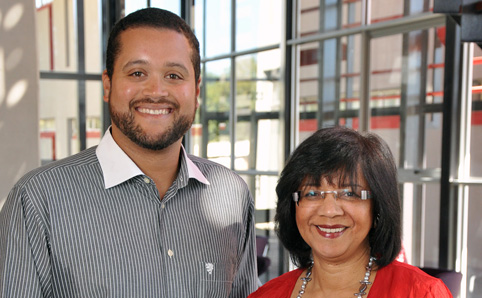Latest News Archive
Please select Category, Year, and then Month to display items
12 January 2024
|
Story Nonsindiswe Qwabe
|
Photo Sonia Small
 Since joining the UFS in 2008, Dr Grey Magaiza has worked extensively on approaches that can foster the socio-economic transformation of societies.
Since joining the UFS in 2008, Dr Grey Magaiza has worked extensively on approaches that can foster the socio-economic transformation of societies.
“The future should be one where communities can decide on their development agenda and futures. That’s the most important for me.” Dr Grey Magaiza, Deputy Director of the Centre for Gender and Africa Studies (CGAS) and Head of the Community Development programme on the Qwaqwa Campus, is passionate about capacitating communities to be agents of change and advancement. His vision for the future emphasises the empowerment of communities to take charge of their development by actively participating in decision making and the implementation of development projects that can improve their lives.
Since joining the UFS in 2008, Dr Magaiza has worked extensively on approaches that can foster the socio-economic transformation of societies. Over the years, he has crafted his research speciality into one that he is most proud of – being an interdisciplinary scientist immersed in the development of communities.
“I’m in a fortunate position of researching what I like. I say ‘fortunate’, because I’ve taken the time to understand what I’m passionate about, which is the overall field of rural livelihoods and livelihood futures – in short, community development. My research starts from an engaged university, understanding the elements that a university must use to enhance transformation and relevance to its immediate community in terms of development.”
One of the ways he has done this is by looking at social entrepreneurship as a development approach for young people in a rural setting. Through workshops with non-profit and civic organisations in Qwaqwa, Dr Magaiza has been helping these organisations to map out their needs and actively meet them through the involvement and support of external role players.
“We understand that communities are part of the national development agenda, but even that national agenda respects community knowledge and intentions and allows communities to shape their identity. A critical enabler of this is community organising. You bring back the capacity in communities to have dialogues on issues affecting them as spaces for engagement, knowledge exchange, and for people to just talk about their way forward.”
By enabling communities to define their development agenda, they can address their specific needs, challenges, and aspirations, he said. “When I look at livelihood futures, it’s quite an exciting aspect of my work – it’s like looking into a fortune tellers’ globe, because you’re not deciding for communities what they should do, but the communities themselves take those decisions.”
Social entrepreneurship important to eradicate poverty
2012-03-30
 |
|
Here are Rhoda Kadalie and Mark Lotter at the Business School
Photo: Stephen Collett
30 March 2012
|
Renowned South African human activist and popular columnist Rhoda Kadalie recently visited the Business School to lecture on social entrepreneurship.
Ms Kadalie has been the Executive Director of Impumelelo since 1999. This organisation rewards innovative government and civil society initiatives that improve social service delivery in the eradication of poverty in South Africa.
She was accompanied by Mr Mark Lotter, Fundraiser and Marketing Manager of Impumelelo. Mr Lotter did a presentation on ground-breaking achievements using best-practice South African case studies, e.g. the Mariannhill Landfill Conservancy, Phelophepa Health Train and mothers2mothers.
They elaborated on the principles underlying the work and contributions of Impumelelo to the future well-being of the nation. It was clear from the lecture and the discussions that followed by MBAs, under- and postgraduate students from different faculties, as well as members of the university community, that the debate on social entrepreneurship is highly relevant, much needed and very important.